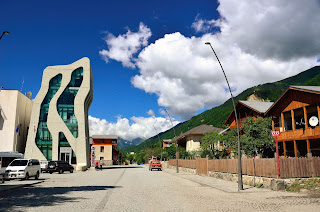 Georgia
with its diverse nature has much to offer for travelers. Every region has its
own must see places, which make them unique and exquisite. But not only nature,
also traditions and native customs determines the history and exclusiveness of
each region.
Georgia
with its diverse nature has much to offer for travelers. Every region has its
own must see places, which make them unique and exquisite. But not only nature,
also traditions and native customs determines the history and exclusiveness of
each region.
In
this post, I want to talk about one of the most outstanding region of Georgia -
Svaneti. Medieval watchtowers, unique nature and oldest traditions, snow-capped
peaks, icy waterfalls – this is a small list of Svanetian wonders.
Brief information about Svaneti
Svaneti
- Georgia’s
historical region and geographical area. It includes the southern slopes of the
Caucasus Mountains and the upper side of Enguri river and Tskhenistsqali. Historical Svaneti Also included Abkhazia
region (upper part of the Kodori river), Samegrelo, Upper Racha and Lechkhumi border regions.
 During
early
centuries the region was part of the kingdom of Colchis
- the Egrisi
Kingdom. In XI-XV centuries Svaneti was one of the stands. When Georgia disintegrated
royal principalities, Svaneti was divided into several parts: the free
Svaneti, Sadadeshkeliano and Sadadiano Svaneti.
During
early
centuries the region was part of the kingdom of Colchis
- the Egrisi
Kingdom. In XI-XV centuries Svaneti was one of the stands. When Georgia disintegrated
royal principalities, Svaneti was divided into several parts: the free
Svaneti, Sadadeshkeliano and Sadadiano Svaneti.
Nowadays the region is divided into two parts, Upper and
Lower Svaneti. They are divided by a ridge of high Svaneti Latpari Peak. Upper
Svaneti present the Enguri River gorge from Samegrelo border, while
the lower region - from the source of Tskhenistskali Valley to
Moore's
Bridge (nearby
Tsageri).
Modern administrative-territorial division
Svaneti is a part
of Samegrelo-Zemo Svaneti region in Mestia, the lower region - Racha-Lechkhumi-Kvemo Svaneti Region of Lentekhi. Overwhelming majority
of Svanetian population are Georgians, namely their ethnic group - Svan.
Svaneti:
traditions and native customs of Svans
 Svaneti
is one of the oldest and most beautiful parts of Georgia, famous for its hospitality.
Svans are peculiar and proud people. Greek historian Herodotus wrote about
them: "Courageous Svans are almost the best in terms of power: they have
everything around and occupy the heights of the peaks of the Caucasus".
The region is still preserved indigenous traditions and religious rites.
Svaneti
is one of the oldest and most beautiful parts of Georgia, famous for its hospitality.
Svans are peculiar and proud people. Greek historian Herodotus wrote about
them: "Courageous Svans are almost the best in terms of power: they have
everything around and occupy the heights of the peaks of the Caucasus".
The region is still preserved indigenous traditions and religious rites.
The
gold mining in Svaneti is associated with the myth of the Argonauts. Svanetian
rivers brought gold dust which was obtained with a lamb leather by the local
population. Greek and Roman writers knew about the gold extraction by Svans.
Argonauts were interested in the Golden Fleece - Golden Fleece wool leather
having brought them to the kingdom of Colchis, which was part of the region.
King Ayat and the kingdom of Colchis were supplied with the gold from Svaneti. Nowadays
there are facts about gold mining.
 In
the mountains there was Institute, which commanded by the Khevisberi. Khevisperies
were called “makhvshi” in Svaneti. He was elected by the General Meeting. Makhvshi
distinguished by wisdom and justice. He was the conductor of the rules of
Christian life, judge in peaceful times, while in case of the army leader.
Makhvshi condemned criminals and cut them off from the community.
In
the mountains there was Institute, which commanded by the Khevisberi. Khevisperies
were called “makhvshi” in Svaneti. He was elected by the General Meeting. Makhvshi
distinguished by wisdom and justice. He was the conductor of the rules of
Christian life, judge in peaceful times, while in case of the army leader.
Makhvshi condemned criminals and cut them off from the community.
Any
civil or criminal case in a local court is considered by judges, which called
"Morvey". They chose from both sides. Morveys listened to both of parties
carefully. The negotiation process often took years. When everything was
clarified, they made an oath on the saint icon. After swearing in, nobody would
doubt about the fairness of the decision. In its judgment, the judges hid a
stone in the ground, which meant the end of the case and the conciliation of
the parties.
In
winter Svans used to build a tower from snow, they put into the center wooden
bar and the top of the tower hung a cross. Youth participating divided into
teams in the celebration. Teams were trying to fall down tower on their side,
this meant to receive a good harvest. Sometimes they organized boxing matches,
and the winning also meant to receive a good harvest. It was indeed a joyful
celebration.
In
a drought years, Svan women used to throw bone into the nearest lake and prayed
for a rain. In some communities men used to bring out icons of Jesus and the
Virgin Mary from the Churches, bring them to the river and sing the song, religious chants praying for the rain.
In
Lenjeri (Village in Svaneti) there still exists a holiday of saint Elia. People
during Elia holiday ask the icon of St. Elia for rain and irrigate their land.
What
about agricultural works, women always worked together with men. During the field works women worked side-by-side with men. Maybe
for this reason a young bride would always bring a reaping hook to her
husband's family together with her dowry.
This is a short list of
Svanetian traditions and native customs. Svaneti is Really amazing part of
Georgia and it worth visiting.

















Комментариев нет:
Отправить комментарий